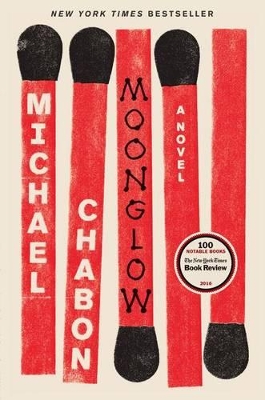Reviewed by gmcgregor on
But the real main event of his life was his marriage to a beautiful French concentration camp survivor. By the time they met, she'd already had Michael's mother, then just a small girl, who he raised as his own. That isn't all that she brought into the marriage, though...she also brought mental instability, haunted by periodic breaks with reality in which she was haunted by a being she called the Skinless Horse. Presented with the opportunity to learn the truth about her life after a bout of hospitalization, Michael's grandfather chooses to not, and instead goes on loving his wife the way he's always known her until her premature death.
As might be expected from a book called Moonglow, the moon is a constant reference point and plays a dominant symbolic role. For Michael's grandfather, obsessed with rockets, it has a traditionally masculine meaning: he wants to explore and conquer it. But the moon is tied throughout history to the feminine, from Greece's Artemis to China's Chang'e. It's also tied to madness, like that which haunts Michael's grandmother. Like the fortunes of both parts of our central couple, it constantly waxes and wanes.
This was my first experience with Chabon, a writer I'd heard great things about, and this was a wonderful introduction to him. He created characters that felt real, especially with the grandma and grandpa (the modern-day characters who frame the story, though, Michael and his mother, feel a bit underdeveloped) and created a relationship that felt honest and lived-in. That these two would come together and stay together and have the impact on each other that they did made sense. I've always been a fan of the character-driven story, and this is exactly that. But there's a decent amount of plot in there for those who prefer that, and I enjoyed the way Chabon developed his story. It's a small detail, but I especially liked the way he left Augenbaugh's lighter unresolved. Tying everything up with a nice little bow isn't how life works, closure doesn't always happen, and I liked that he left that little mystery hanging. I'll definitely be reading more of his work, and would highly recommend this book.
Reading updates
- Started reading
- 9 April, 2017: Finished reading
- 9 April, 2017: Reviewed
